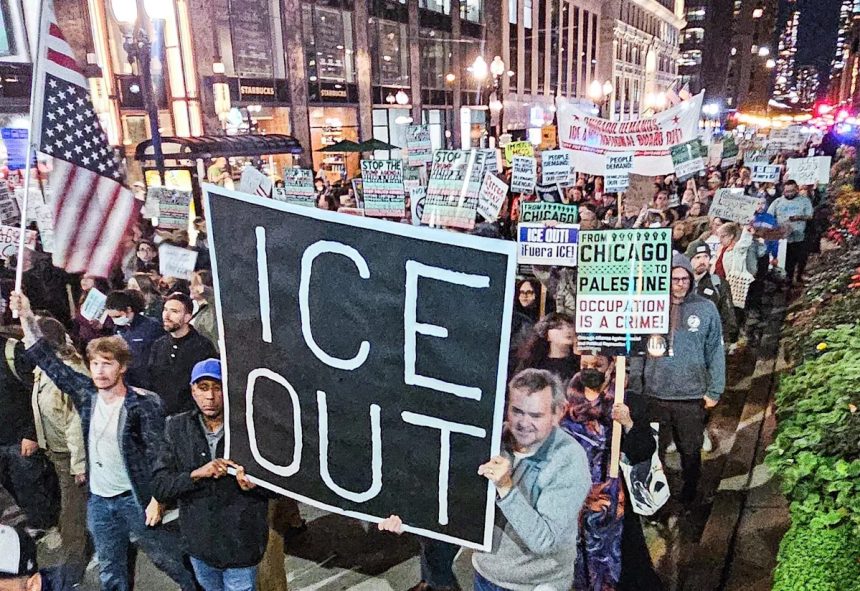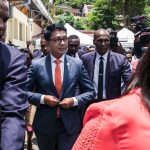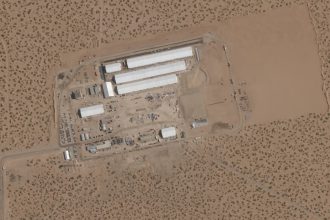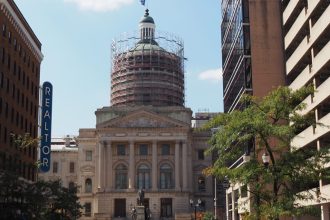The nationwide “No Kings” movement is set to return to the streets of Illinois this Saturday, Oct. 18, in response to recent actions by the Trump administration and the U.S. Customs and Immigration Enforcement.
The demonstrations are scheduled across dozens of Illinois cities, including Chicago, Springfield, Rockford and Peoria.
For those planning to join the rallies, here’s what you should know about which rights are protected and what actions should be avoided.
Know your rights: What protesters can and can’t do in Illinois
Protestors are granted certain freedoms under the First Amendment, including the right to:
-
Demonstrate, such as taking part in a rally or march
-
Donate to groups and political candidates
-
Get together with other people to talk about issues
These rights come with limitations, however.
Though not exhaustive, here are a few rules Illinois protestors must follow, according to the ACLU of Illinois and Illinois Legal Aid Online.
-
Your right to free speech is strongest in public spaces, such as streets, sidewalks and parks.
-
You can typically speak out on other public property, like plazas in front of government buildings, as long as you are not blocking access to the building or interfering with any other purposes of the building.
-
You must receive permission from the owner to protest on private property. You may protest on your own private property.
-
Counterprotests should receive the same rights as protests, and the two should be allowed within sight and sound of the other, but antagonistic groups should be separated.
-
You can photograph anything in plain view, including federal buildings and the police, while protesting on public property.
-
You must get consent from the owner to photograph or film anything on private property.
-
You don’t need a permit to march on sidewalks or streets, as long as you are not blocking pedestrian or car traffic.
-
Marches or parades that require blocking traffic or street closures, large rallies requiring the use of sound amplifying devices or rallies over a certain size may require permits.
-
Permits cannot be denied because the event is controversial, filing procedures weren’t followed in time before a breaking news event or the application fee was too high.
-
You cannot disrupt public order or harm others while protesting.
-
You cannot incite imminent violence or crime while protesting.
Can police disperse protests?
Police may shut down a protest through a dispersal order, according to the ACLU of Illinois, but it must be used as a last resort in situations where there is a clear and present danger of riot, disorder or interference with traffic, as well as any other immediate threats to public safety.
If officers choose to do so, they must provide protestors a reasonable opportunity to comply with the order, including sufficient time and a clear, unobstructed exit path, ACLU says.
Demonstrators must be given clear details concerning the order before they are arrested or charged with any crime, according to ACLU. These include information about how much time they have to disperse, the consequences of failing to do so, and what clear exit route they can follow.
What to do if you believe your rights have been violated
ACLU of Illinois suggests the following:
-
Write down everything you remember when you can, including the officers’ badge and patrol car numbers and the agency they work for.
-
Get contact information for witnesses.
-
Take photographs of any injuries.
-
File a written complaint with the agency’s internal affairs division or civilian complaint board.
What to do if you are stopped by police
-
Stay calm with your hands visible and point out that your actions are protected under the First Amendment.
-
Ask if you are free to leave.
-
If you are under arrest, ask why and request a lawyer.
-
You have the right to make three phone calls.
-
You do not have to consent to a search of yourself or your belongings, though police may “pat down” your clothing if they suspect you have a weapon.
-
Police officers may not confiscate or demand to view your photographs or video without a warrant, nor may they delete any data.
What are ‘No Kings’ protests?
The protest’s organizer, Indivisible, originally planned the June 14 demonstration as a “nationwide day of defiance” in response to the $40 million military parade President Donald Trump orchestrated on his birthday.
The movement preaches the idea that “America has No Kings,” and says, “Now, President Trump has doubled down,” referencing the recent actions of U.S. Immigration and Customs Enforcement (ICE) officers, healthcare cuts and more.
“The president thinks his rule is absolute,” the site says. “But in America, we don’t have kings and we won’t back down against chaos, corruption and cruelty.”
When and where are ‘No Kings’ protests in Illinois? ‘No Kings’ protests near me
The times and addresses of the Oct. 18 protests scheduled in Illinois can be found below. Events without addresses have private locations, and more details can be found after signing up on the “No Kings” website.
-
Chicago (North side): 10 a.m.-Noon
-
Chicago’s Lincoln Park: 10-11:30 a.m. @ Oz Park (Tin Man sculpture)
-
Chicago (Northwest side): 9:30-11 a.m. @ Unity Park
-
Chicago (South side): 3-5 p.m. @ 103rd and Western
-
Arlington Heights: 3-5 p.m. @ Recreation Park Soccer Field
-
Aurora: Noon-2 p.m. @ McCarty Park
-
Bartlett: 11 a.m.-1 p.m. @ SW corner where Bartlett Veterans Memorial is located
-
Belleville: 10 a.m.-2 p.m.
-
Bloomington: Noon-1 p.m. @ Bloomington Center for the Performing Arts
-
Bolingbrook: 11 a.m.-1 p.m. @ NE Corner of Janes and Boughton
-
Buffalo Grove: 1-2:30 p.m.
-
Carbondale: 1-3 p.m. @ Lenus Turley Park
-
Carlinville: Noon-2 p.m. @ Macoupin County Courthouse
-
Charleston: 11:30 a.m.-2 p.m.
-
Crystal Lake: 11:30 a.m.-1:30 p.m.
-
DeKalb: Noon-1:30 p.m. @ Hopkins Park
-
Edwardsville: Noon-1 p.m. @ Edwardsville Public Library
-
Elgin: 11 a.m.-4 p.m. @ Corner of Kimball and Grove
-
Elmhurst: 2:30-4:30 p.m. @ Elmhurst City Hall
-
Evanston: 10:30 a.m.-Noon @ Evanston Fountain Square
-
Forest Park: 11 a.m.-1 p.m. @ Chicago Bulk Mail Facility
-
Galena: 11 a.m.-Noon near Galena Main Street Bridge
-
Geneva: 11:30 a.m.-1 p.m.
-
Gibson City: 9-11 a.m. @ Gibson City Clerk
-
Gurnee: 10 a.m.-Noon @ Grand Avenue & Hunt Club Road
-
Hampshire, Pingree Grove and Gilberts: Noon-3 p.m. Between gas stations and on all corners
-
Joliet: 11 a.m.-1 p.m. @ Mall Loop Drive
-
Kankakee: 2-4 p.m. @ Kankakee County Courthouse
-
Kewanee: Noon-1:30 p.m. @ 2nd & Main Streets
-
Lagrange: 11 a.m.-12:30 p.m.
-
Morris: 2:30-4 p.m. @ Old Pizza Hut
-
Mount Prospect: 2-3 p.m. @ Corner of Main and NW Hwy
-
Mount Vernon: 11 a.m.-1 p.m.
-
Naperville: Noon-2 p.m. @ Naperville Municipal Center
-
Oak Park: 11 a.m.-1 p.m.
-
Oregon: 3-5 p.m. @ Ogle County Courthouse
-
Ottawa: 11 a.m.- 1 p.m. @ Washington Square Park
-
Palatine: 11:30 a.m.-1 p.m. @ Volunteer Plaza at Clock Tower
-
Park Ridge: Noon-1:30 p.m.
-
Princeton: 11 a.m.-1 p.m. @ Rotary Park (formerly Darius Miller Park)
-
Peoria: 1-2:30 p.m. @ Sidewalks along War Memorial Drive (public spaces)
-
Paxton: Noon-2 p.m. @ SE Corner of Market Street & Pells Street
-
Quincy: 11 a.m.-1 p.m. @ Rep. Mary Miller’s Office
-
Rockford: 11 a.m.-1 p.m. @ Haight Park
-
Schaumburg: 10 a.m.-Noon
-
Springfield: Noon-2 p.m. @ Illinois State Capitol
-
Sterling: Grandon Civic Center
-
Union Precinct: 9 a.m.-9 p.m. @ Snake Road
-
Urbana: Noon-2 p.m. @ Champaign County Court House
-
Wilmette: 11 a.m.-12:30 p.m. @ Village Hall
-
Wheaton: 11 a.m.-12:30 p.m.
Tom Vanden Brook contributed to this article.
This article originally appeared on Journal Star: ‘No Kings’ rallies: Know your rights as protesters in Illinois









